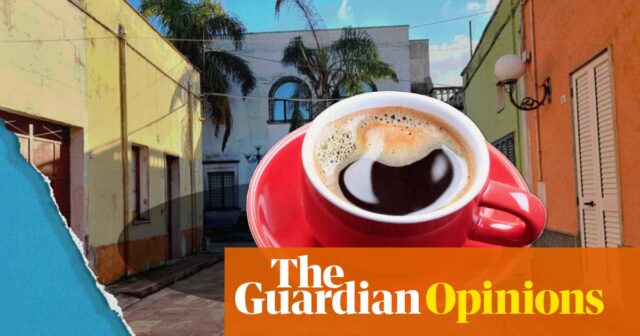Since I was small, I have liked sitting on stairs to read. In my childhood home, in Nuneaton, I favoured the square of carpet between the two flights, positioned directly opposite the wall-mounted clock, so I could keep an eye on how many pages I could squeeze in before bed. My favourite place to read, though, has always been the red tiled steps that lead to the front door of my nonna’s house in Puglia. There are photos of me and my cousins on those steps at every age. If I close my eyes, I can feel the terracotta under my hands, somehow always warm, even in deepest winter.
Throughout my childhood, I grappled with the question: “Ti senti più inglese o più italiana?” – do you feel more English or more Italian? I’m British-Italian, and most of my family live in the heel of Italy’s boot, in a very small town of – at the last census – 6,200 inhabitants. My mum is one of five siblings, and the only one who moved any real distance from San Donaci, relocating to the Midlands for love, before having me, her only child.
I didn’t always appreciate my second home, the same way I didn’t always appreciate my second identity. My 93-year-old nonna lives at the entrance to the town, and her children fan out from her. My aunts all live on the same street and the proximity of family in San Donaci means there’s little privacy, certainly no locking of doors – one of my cousins once had to hide a boyfriend in the shower when Nonna let herself in the house without knocking. Even outside the home, the whole town knows each other, so you’re never completely alone. If, by some miracle, you’re not immediately recognised, it’s not uncommon to hear the phrase: “A chi appartieni?” – who do you belong to?
As a teenager, I tried to keep these two sides of my life separate. It has become family folklore that I used to elbow my mum when she’d speak to me in Italian in England. My rules were clear: we speak English in England and Italian in Italy, and we never mix the two. But my mum and aunts never got the memo. At Easter and Christmas, I was sent to school in San Donaci, the local children grilling me on how best to swear in English, and my cousins all did shifts in the Nuneaton McDonald’s in the summer, their young colleagues butchering their beautiful names: Federica became Freddy; Salvatore became Torey.
In time, it became clear to me just how much beauty there is in being both. I speak Italian with the strong local accent, and when my cousins started taking me out to nightclubs, I’d switch from one language to the other as my party trick. Being southern Italian is a huge part of who I am, not always just half. When I’m there, I have my room, my rituals, clothes that stay there year round, people who have known me my whole life. There’s immense comfort in that.
Nonna finds it painful to think of her grandchildren sprinkled around Europe. She often asks, “Quando te ne torni?” – when will you come back? She means, for good. But part of what makes her house so special is how we get all the good without too much of the bad. It’s an idyll because we don’t have to look too hard at the cracks, like how there are no jobs in the town and the infrastructure is stretched to capacity. I watch her sometimes, when we’re all together, and can tell she’s doing an internal headcount. Here they all are, each of my chicks back in the nest. The grandchildren broke her heart when we all flocked far and wide: Milan, Brussels, Paris.
For me, it was London. I have lived here most of my adult life, and though it’s the city I love, it’s also a place that can make you feel anonymous: I’m one of almost 9 million here. Nobody is approaching me in Hackney to ask who I belong to – I still get a thrill if I see a familiar face in my neighbourhood. I live in a first-floor flat, so the stairs in my house are communal and not available to sit on, though admittedly I’ve never tried. I flirt with the idea of having a friendship with my neighbours – like many Londoners, I want both to never be bothered by anyone, but also crave a sense of belonging. In San Donaci, my nonna is something of a local celebrity and has no such problems – when she goes out, people stop her on every corner for a chat, and she is rarely allowed to pay for her own coffee.
I have found my Italian community here, though. A huge number of Sandonacesi in their 20s and 30s have migrated to London for work, including my childhood best friend – whose father happens to be the current mayor of San Donaci. The Christmas flights are only two a week, so you see the same faces on the plane every year. The joy they radiate is a balm: I just know that they are daydreaming about fave e cicoria, Christmas morning breakfast on the beach, and being suffocated by their massive families. This December, I will board that flight, see those faces and be picked up from the airport by one of my aunts. The first thing I will do is sit on the red tile steps with a coffee and a book. But it won’t be long before Nonna comes to distract me.






